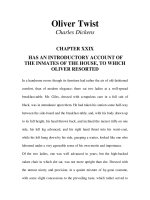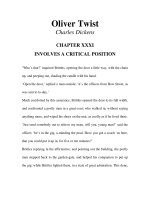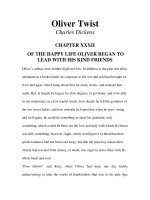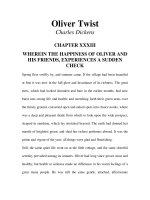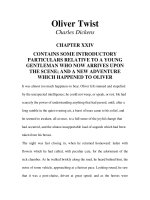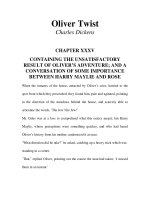Tài liệu LUYỆN ĐỌC TIẾNG ANH QUA TÁC PHẨM VĂN HỌC-Oliver Twist -Charles Dickens -CHAPTER 44 pdf
Bạn đang xem bản rút gọn của tài liệu. Xem và tải ngay bản đầy đủ của tài liệu tại đây (28.42 KB, 11 trang )
Oliver Twist
Charles Dickens
CHAPTER XLIV
THE TIME ARRIVES FOR NANCY TO
REDEEM HER PLEDGE TO ROSE MAYLIE.
SHE FAILS.
Adept as she was, in all the arts of cunning and dissimulation, the girl Nancy
could not wholly conceal the effect which the knowledge of the step she had
taken, wrought upon her mind. She remembered that both the crafty Jew and
the brutal Sikes had confided to her schemes, which had been hidden from
all others: in the full confidence that she was trustworthy and beyond the
reach of their suspicion. Vile as those schemes were, desperate as were their
originators, and bitter as were her feelings towards Fagin, who had led her,
step by step, deeper and deeper down into an abyss of crime and misery,
whence was no escape; still, there were times when, even towards him, she
felt some relenting, lest her disclosure should bring him within the iron grasp
he had so long eluded, and he should fall at last—richly as he merited such a
fate—by her hand.
But, these were the mere wanderings of a mind unwholly to detach itself
from old companions and associations, though enabled to fix itself steadily
on one object, and resolved not to be turned aside by any consideration. Her
fears for Sikes would have been more powerful inducements to recoil while
there was yet time; but she had stipulated that her secret should be rigidly
kept, she had dropped no clue which could lead to his discovery, she had
refused, even for his sake, a refuge from all the guilt and wretchedness that
encompasses her—and what more could she do! She was resolved.
Though all her mental struggles terminated in this conclusion, they forced
themselves upon her, again and again, and left their traces too. She grew
pale and thin, even within a few days. At times, she took no heed of what
was passing before her, or no part in conversations where once, she would
have been the loudest. At other times, she laughed without merriment, and
was noisy without a moment afterwards—she sat silent and dejected,
brooding with her head upon her hands, while the very effort by which she
roused herself, told, more forcibly than even these indications, that she was
ill at ease, and that her thoughts were occupied with matters very different
and distant from those in the course of discussion by her companions.
It was Sunday night, and the bell of the nearest church struck the hour. Sikes
and the Jew were talking, but they paused to listen. The girl looked up from
the low seat on which she crouched, and listened too. Eleven.
’An hour this side of midnight,’ said Sikes, raising the blind to look out and
returning to his seat. ‘Dark and heavy it is too. A good night for business
this.’
’Ah!’ replied Fagin. ‘What a pity, Bill, my dear, that there’s none quite
ready to be done.’
’You’re right for once,’ replied Sikes gruffly. ‘It is a pity, for I’m in the
humour too.’
Fagin sighed, and shook his head despondingly.
’We must make up for lost time when we’ve got things into a good train.
That’s all I know,’ said Sikes.
’That’s the way to talk, my dear,’ replied Fagin, venturing to pat him on the
shoulder. ‘It does me good to hear you.’
’Does you good, does it!’ cried Sikes. ‘Well, so be it.’
’Ha! ha! ha!’ laughed Fagin, as if he were relieved by even this concession.
‘You’re like yourself to-night, Bill. Quite like yourself.’
’I don’t feel like myself when you lay that withered old claw on my
shoulder, so take it away,’ said Sikes, casting off the Jew’s hand.
’It make you nervous, Bill,—reminds you of being nabbed, does it?’ said
Fagin, determined not to be offended.
’Reminds me of being nabbed by the devil,’ returned Sikes. ‘There never
was another man with such a face as yours, unless it was your father, and I
suppose HE is singeing his grizzled red beard by this time, unless you came
straight from the old ‘un without any father at all betwixt you; which I
shouldn’t wonder at, a bit.’
Fagin offered no reply to this compliment: but, pulling Sikes by the sleeve,
pointed his finger towards Nancy, who had taken advantage of the foregoing
conversation to put on her bonnet, and was now leaving the room.
’Hallo!’ cried Sikes. ‘Nance. Where’s the gal going to at this time of night?’
’Not far.’
’What answer’s that?’ retorted Sikes. ‘Do you hear me?’
’I don’t know where,’ replied the girl.
’Then I do,’ said Sikes, more in the spirit of obstinacy than because he had
any real objection to the girl going where she listed. ‘Nowhere. Sit down.’
I’m not well. I told you that before,’ rejoined the girl. ‘I want a breath of
air.’
’Put your head out of the winder,’ replied Sikes.
’There’s not enough there,’ said the girl. ‘I want it in the street.’
’Then you won’t have it,’ replied Sikes. With which assurance he rose,
locked the door, took the key out, and pulling her bonnet from her head,
flung it up to the top of an old press. ‘There,’ said the robber. ‘Now stop
quietly where you are, will you?’
’It’s not such a matter as a bonnet would keep me,’ said the girl turning very
pale. ‘What do you mean, Bill? Do you know what you’re doing?’
’Know what I’m—Oh!’ cried Sikes, turning to Fagin, ‘she’s out of her
senses, you know, or she daren’t talk to me in that way.’
’You’ll drive me on the something desperate,’ muttered the girl placing both
hands upon her breast, as though to keep down by force some violent
outbreak. ‘Let me go, will you,—this minute—this instant.’
’No!’ said Sikes.
’Tell him to let me go, Fagin. He had better. It’ll be better for him. Do you
hear me?’ cried Nancy stamping her foot upon the ground.
’Hear you!’ repeated Sikes turning round in his chair to confront her. ‘Aye!
And if I hear you for half a minute longer, the dog shall have such a grip on
your throat as’ll tear some of that screaming voice out. Wot has come over
you, you jade! Wot is it?’



